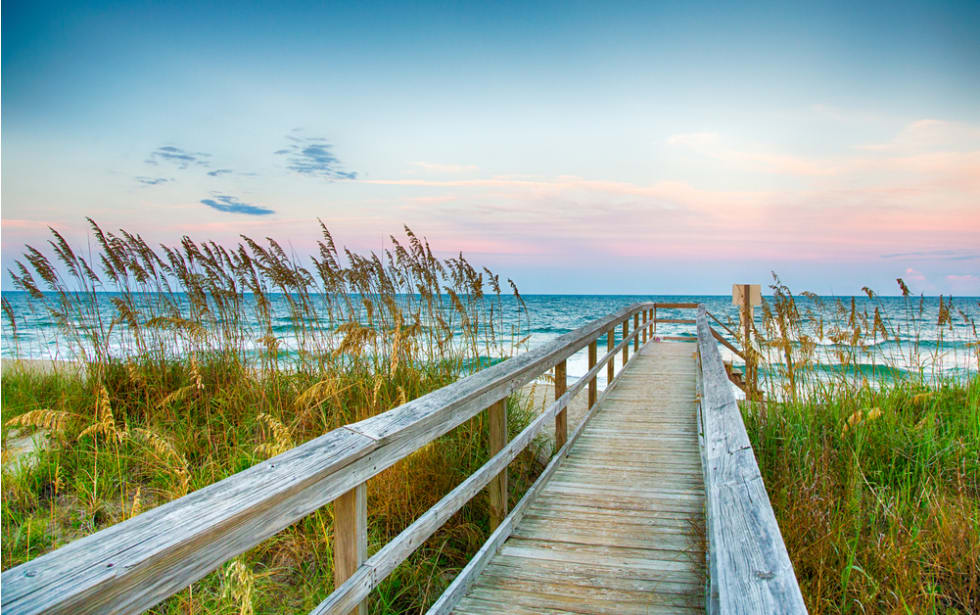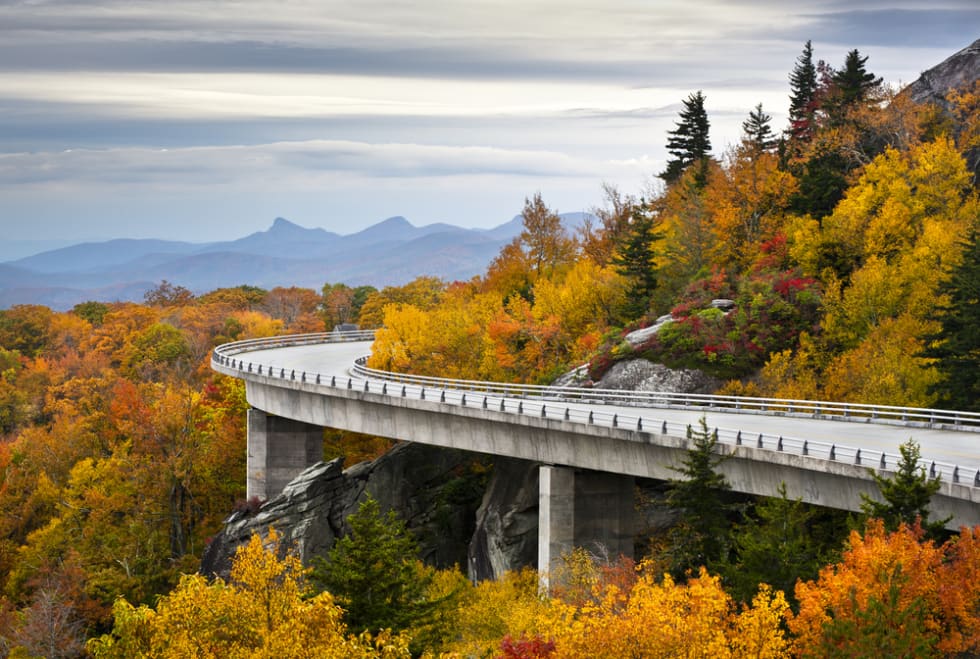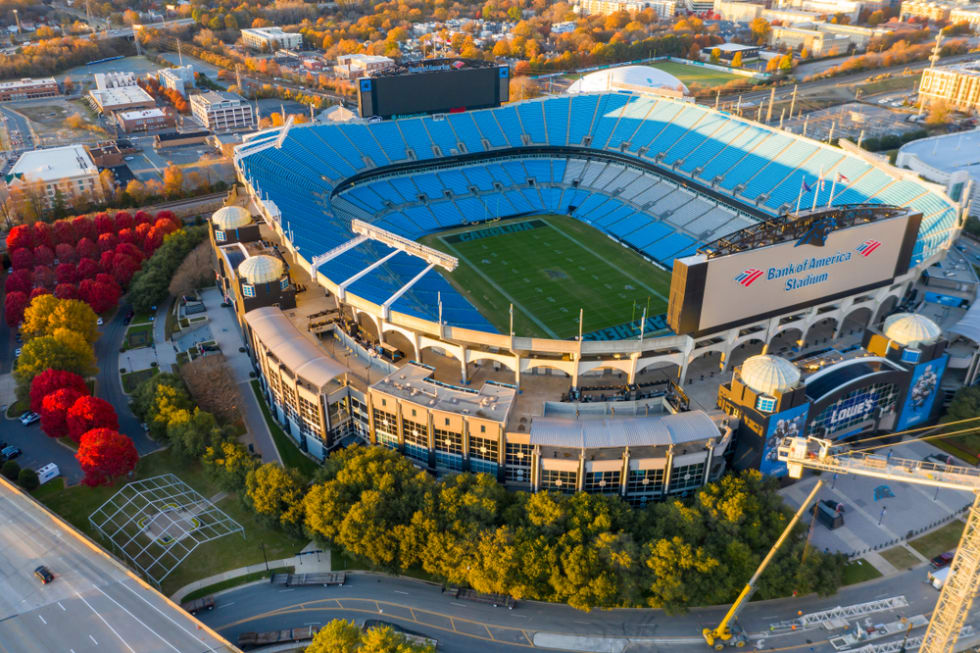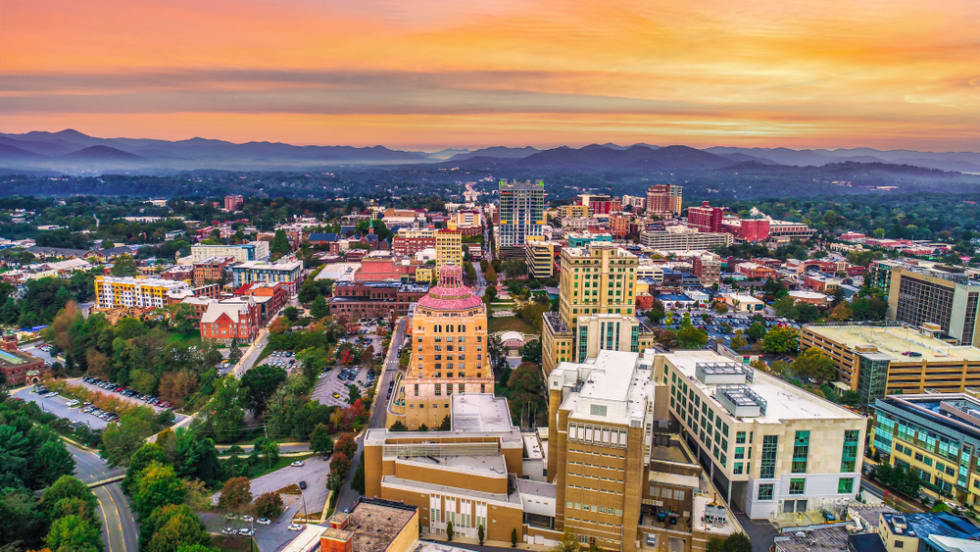Aura Booth Park
- 398 units available
- 1 bed • 2 bed • 3 bed • 4 bed
- Amenities
In unit laundry, Patio / balcony, Hardwood floors, Dishwasher, Pet friendly, Garage + more

Over 10 million people call the rapidly-growing state of North Carolina home. With its reasonable cost of living, high-quality of life, booming economy, and natural beauty, it’s a wonderful place to live.
You can choose your own adventure in North Carolina and live in a busy metropolis like Charlotte or along the coast in the Outer Banks. The state offers variety and charm, so make sure you find the best spot for you with our round-up of things to know before removing to North Carolina.

North Carolina is the 28th most extensive and 9th most populous state in the U.S. South Carolina, Virginia, Tennessee, and Georgia are North Carolina's southeastern neighbors. Its convenient location makes it easy to drive to nearby cities, including Atlanta, Columbia, and Knoxville. In addition, North Carolina offers scenic landscapes and mild weather in charming, waterfront cities like Wilmington, the mountains surrounding Asheville, or the urban core of Charlotte.
In 1587, North Carolina's Roanoke Island became the first English Settlement in the New World and the birthplace of the first English child born in America. Many people believe North Carolina was also the first colony to declare independence from Great Britain in 1775. The Tar Heel State cemented its reputation of fierce independence when it became the 12th state of the Union after the American Revolution before succeeding and joining the Civil War in 1861.
North Carolina is also known as the "first in flight" in honor of the Wright brothers completing their first flight in Kitty Hawk. With a combination of charm, history, and innovation, North Carolina attracts newcomers looking for a high-quality life.
North Carolina offers a reasonable cost of living, especially considering its attractive Atlantic coastline and thriving cities. According to Best Places, the cost of living in North Carolina is 90.6 compared to the U.S. average of 100.
Here's how Payscale broke down how much things cost when moving to Raleigh, the capital of North Carolina.
Rents vary depending on where you live in North Carolina, but the overall cost of living is on the rise. For example, the rents in Raleigh increased by 21.7% year-over-year. You should expect to pay a median of $1,342 for a one-bedroom apartment or $1,536 for a two-bedroom in Raleigh.
Living comfortably in a one-bedroom apartment in Raleigh means planning for an income of at least $53,680 a year or about $25.81 an hour. For a two-bedroom apartment, you'll need to earn at least $61,440 a year or approximately $29.54 an hour.
Learn more about some of the average rent in Raleigh and the average rent in Charlotte.
The median income in North Carolina is $56,642, as reported by the Census Bureau in 2020 dollars.
The cost of living in North Carolina has remained reasonable but is increasing as more people relocate to the area. However, there are opportunities to explore culture, attractions, beaches, outdoor fun, and new careers in the Tar Heel State. You can find just about anything you're looking for in North Carolina and still find an affordable place to live.
Situating yourself in the heart of Raleigh, Charlotte, Durham, or Asheville will be more costly than smaller towns like Cary. However, the overall economy in North Carolina is strong, making it easier to find a job and apartment that suits your lifestyle and budget.
Apartment List's recent migration report shows that the highest share of people moving to areas like Raleigh is from Charlotte and Durham. New transplants are also moving to North Carolina from Atlanta. When people leave Raleigh, they stay in the Tar Heel State and head to Durham, Charlotte, otherwise, they go to Charleston.
People are also moving to Charlotte from Atlanta, Raleigh, and Myrtle Beach. In addition, outbound moves are drawing people to nearby Raleigh, Charleston, and Columbia.
If you're moving to Greensboro, you'll join newcomers from Winston-Salem, Charlotte, and Atlanta. People are also relocating from Greensboro to Charlotte, Winston, and Raleigh.

North Carolina boasts the 11th-largest economy by GDP in the U.S. at around $589 billion. That state's economy focuses on food processing, banking, aerospace, pharmaceuticals, technology, and automotive parts.
Charlotte has rapidly grown into the second-largest banking center in the nation. In addition, Raleigh and Durham and the town of Chapel Hill are home to Research Triangle Park, attracting more than 200 companies. In Raleigh, locals enjoy manufacturing, trade, transportation and utilities, information, and finance opportunities. In Greensboro, newcomers can find employment in furniture, textiles, retail, wholesale trade, and tobacco.
Like Charlotte, North Carolina's cities offer some public transportation that eliminates the need for a car if you live, work, and play in its downtown cores. However, North Carolina's driving culture is alive and well, and you need a vehicle to get around or take a day trip to the beach or mountain waterfalls.
Several major highways cross through North Carolina, including I-77, I-85, I-87, and I-95. In addition, cities like Raleigh, Charlotte, Asheville, and Chapel Hill offer public transportation options. For example, Charlotte's LYNX Blue Line light rail connects to Uptown from 15 different stops across 9.6 miles. Chapel Hill connects with the regional transit provider, GoTriangle, with a bus service.
North Carolina’s climate attracts newcomers looking for temperature weather. However, summers are hot and muggy, and winters can get cold and wet. The overall temperatures vary from 33°F to 89°F, making it comfortable to live without extreme highs or lows.

North Carolina's attractions include a unique natural shoreline, beauty, arts, culture, and history for endless day trips and fun. Here are a few to ideas and stops to add to your must-do list.
The Blue Ridge Mountains are situated in the larger Appalachian Mountains range-extending 550 miles from various states and through North Carolina. The National Parkway is celebrated for its scenic beauty and stops like the Great Smoky Mountains National Park near Cherokee. The park features trails, an observation tower on Clingmans Dome, and year-round wildflowers.
Situated in Asheville, the Biltmore Estate is a historic house museum and tourist attraction in a Châteauesque-style mansion. Beyond the home, the Biltmore area offers dining, pubs, shopping, and dining grounds.
North Carolina's Outer Banks are scenic barrier islands in the Atlantic Ocean that attract nature-loving tourists and newcomers looking to settle on its shores. You’ll find over 100 miles of shoreline with seaside villages and towns filled with inns, hotels, and campgrounds. Hatteras Island is a crowd-pleaser and kayaking along with the islands.
Spectacular views and hiking trails attract nature lovers looking for outdoor adventures. The 535-million-year-old Chimney Rock monolith is among the most iconic sites in North Carolina, with 75-mile panoramic views in Hickory Nut Gorge and Lake Lure. In addition, challenging and scenic trails offer mountainside experiences, including a 315-foot rock formation along the Outcroppings trail.
The North Carolina Museum of Natural Sciences is situated in downtown Raleigh with natural history exhibits, events, and exhibitions from dinosaurs to meteorites. It's the largest natural history museum in the Southeast, combining permanent, specialty, and digital media exhibitions.
North Carolina's hidden gems include stunning waterfalls nestled into its mountain towns. Whitewater Falls, Linville Falls, and the falls in Dupont State Park are among top-rated favorites, as well as Catawba Falls and Looking Glass Falls.
Raleigh's North Carolina Museum of Art opened in 1956 and became the first major museum collection formed by state legislation and funding. The 164-acre park offers films, performances, and concerts throughout the year. Exhibitions include combinations of local and international artists spanning more than 5,000 years.
North Carolina is filled with foodie cities, including Asheville and its sweet potato pancakes at Tupelo honey Cafe. Raleigh's food scene is also worth the drive with stops like Beasley's for fried chicken and waffles and steamed oysters at Shuckers Oyster Bar and Grill. Charlotte boasts coffee and pastries at Amélie's French Bakery & Café and essential dining at River's Edge and Haberdash.
North Carolina is famous for its barbecue in a whole-hog style with lemon juice or vinegar and a pepper-based sauce. We can also thank the Tar Heel State for being the birthplace of Pepsi, Cheerwine, Mt. Olive Pickles, and Krispy Kreme!
You'll find something for every occasion in North Carolina, from music to food. The Rogallo Kite Festival is held each year in Kitty Hawk to honor NASA scientist Francis Rogallo who invented the flexible wing and sparked the sport of hang gliding. The North Carolina Azalea Festival is the largest in the state, complete with galas and live entertainment.
In a state so passionate about barbecue, Lexington draws thousands of visitors, sampling dozens of restaurants, arts, crafts, and treats. The Lake Eden Arts Festival (LEAF) features one of the best cultural festivals in the Southeast with local and international music, crafts, cuisine, ziplining, canoeing, and food. In addition, the North Carolina Jazz Festival features over a dozen jazz musicians with live music and food.

Like the rest of the south, college sports is a big deal in North Carolina. North Carolina is a sports state with teams like the Charlotte Hornets, Carolina Panthers, Carolina Hurricanes, and Charlotte FC. Its neighbor, South Carolina, does not have any professional sports team and supports its northern neighbor in the major leagues. Duke University in Durham is among the fan favorites where the Blue Devils play in the NCAA Division I league.
North Carolina embraces higher education with opportunities for students and professional academics looking to teach and lead. Duke University, the University of North Carolina at Chapel Hill Wake Forest, and North Carolina State University are among the more popular institutions.

North Carolina has dozens of cities, coastal towns, and suburbs. Here are a few to start your apartment hunt.
Charlotte is a prominent urban leader in North Carolina and its most populous city. The reasonable cost of living, robust job market, great food, and entertainment make it a win for newcomers.
The business and financial hub doubles as a university town with UNC Charlotte and is home to the NFL's Carolina Panthers and NBA's Charlotte Hornets. Make sure you're a sports car fan; NASCAR is part of its epicenter, and Charlotte is home to its namesake hall of fame.
Asheville offers a mix of Southern charm and hip, trend-setting style. Its unique neighborhoods offer their own signature pubs, coffee shops, and dining. Its lively music scene, breweries, and access to nature make it a win for college grads and millennials looking for cosmopolitan amenities with laid-back charm.
As the capital of North Carolina, Raleigh is home to the finance and tech hub at Research Triangle Park. A young vibe surrounds Raleigh attending its nine colleges, including North Carolina State University, or looking for new startups and growing businesses opportunities. The city is also home to numerous James Beard-nominated chefs, pubs, and 19th-century Greek Revival–style buildings.
Durham is among the fastest-growing cities in the country and an ideal place to live in North Carolina for its arts and culture scene and is part of the state's Research Triangle that attracts ambitious entrepreneurs.
Durham is situated near Raleigh and Chapel Hill and attracts students to attend Duke University and the University of North Carolina. Beyond its arts, culture, and business opportunities, Durham is also known as the "City of Medicine" for its influx of healthcare professionals and job opportunities.
Winston-Salem offers southern charm and hospitality with a modern twist. A fantastic food scene contributes to festivals, including Taste Carolina Winston-Salem with line dancing, cuisine, and fun. You're not far from the mountains or the beach, and local Wake Forest students have their choice of breweries and local coffee shops playing live music.
Ready to move to North Carolina for a reasonable cost of living, business opportunities, arts, culture, and fun? Register for Apartment List and explore the best neighborhoods in North Carolina.
The climate in North Carolina attracts newcomers looking for temperature weather. However, summers are hot and muggy, and winters can get cold and wet. The overall temperatures vary from 33°F to 89°F, making it comfortable to live without extreme highs or lows.
North Carolina’s time zone is Eastern Standard/Daylight Time (EST and/or EDT), depending on the time of year. It is also Greenwich Mean Time - 4 (GMT-4), the same time as New York City.
You'll find something for every occasion in North Carolina, from music to food. The Rogallo Kite Festival is held each year in Kitty Hawk to honor NASA scientist Francis Rogallo who invented the flexible wing and sparked the sport of hang gliding. The North Carolina Azalea Festival is the largest in the state, complete with galas and live entertainment.
North Carolina is in the Southeastern region of the U.S.
The rapidly-growing state of North Carolina offers a reasonable cost of living, high-quality of life, booming economy, and natural beauty, making it a wonderful place to live. You can choose your adventure in North Carolina and live in a busy metropolis like Charlotte or along the coast in the Outer Banks.
The pros of living in North Carolina include abundant outdoor activities, temperate weather, low cost of living, and a great sense of community. The cons of living in North Carolina include the threat of hurricanes, high tax burden, sub-par early education, and lack of changing weather. Everywhere has its pros and cons; you just have to decide what works best for you!
The five best cities in North Carolina are Charlotte, Asheville, Raleigh, Durham, and Winston-Salem.
North Carolina’s convenient location makes it easy to drive to nearby cities, including Atlanta, Columbia, and Knoxville. In addition, North Carolina offers scenic landscapes and mild weather in charming, waterfront cities like Wilmington, the mountains surrounding Asheville, or the urban core of Charlotte.
As of 2022, North Carolina has a flat state income tax rate of 5.25%. The statewide sales tax rate is currently 4.75%.
North Carolina's economy focuses on food processing, banking, aerospace, pharmaceuticals, technology, and automotive parts.
Higher education is fully embraced in North Carolina with opportunities at Duke University, the University of North Carolina at Chapel Hill Wake Forest, and North Carolina State University.
There are plenty of things to do in North Carolina, whether you like spending your time catching a college or professional sports game. Or, if you consider yourself a bit of a foodie, the barbeque, sweet potato pancakes, and steamed oysters will not disappoint. Because you have too many options, finding something to do in North Carolina can be challenging.

In unit laundry, Patio / balcony, Hardwood floors, Dishwasher, Pet friendly, Garage + more
In unit laundry, Patio / balcony, Hardwood floors, Dishwasher, Pet friendly, Garage + more